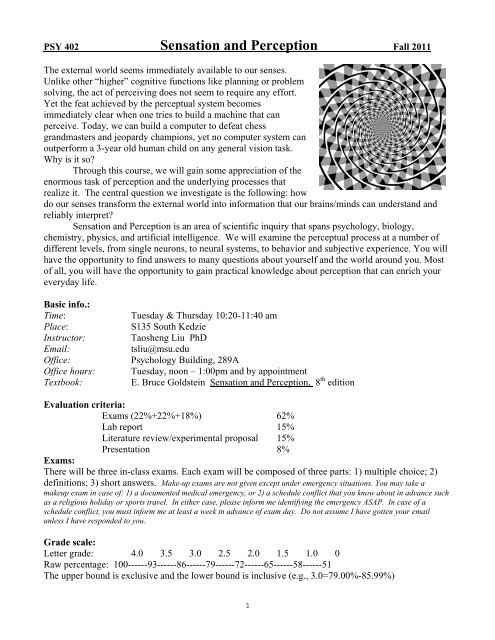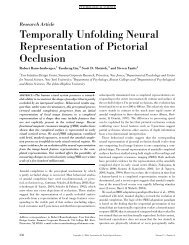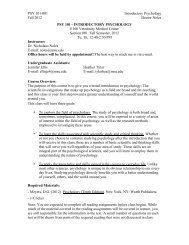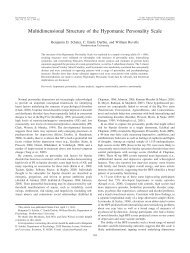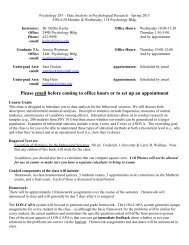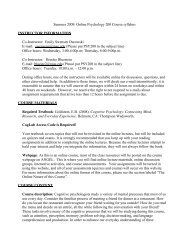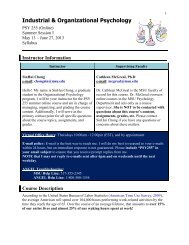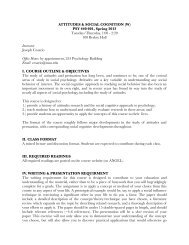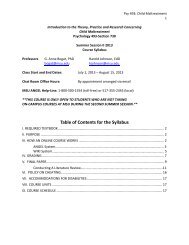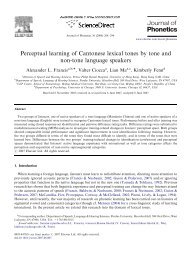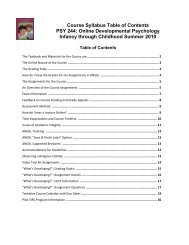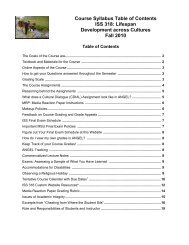Sensation and Perception - Department of Psychology
Sensation and Perception - Department of Psychology
Sensation and Perception - Department of Psychology
- No tags were found...
Create successful ePaper yourself
Turn your PDF publications into a flip-book with our unique Google optimized e-Paper software.
PSY 402 <strong>Sensation</strong> <strong>and</strong> <strong>Perception</strong> Fall 2011The external world seems immediately available to our senses.Unlike other “higher” cognitive functions like planning or problemsolving, the act <strong>of</strong> perceiving does not seem to require any effort.Yet the feat achieved by the perceptual system becomesimmediately clear when one tries to build a machine that canperceive. Today, we can build a computer to defeat chessgr<strong>and</strong>masters <strong>and</strong> jeopardy champions, yet no computer system canoutperform a 3-year old human child on any general vision task.Why is it so?Through this course, we will gain some appreciation <strong>of</strong> theenormous task <strong>of</strong> perception <strong>and</strong> the underlying processes thatrealize it. The central question we investigate is the following: howdo our senses transform the external world into information that our brains/minds can underst<strong>and</strong> <strong>and</strong>reliably interpret?<strong>Sensation</strong> <strong>and</strong> <strong>Perception</strong> is an area <strong>of</strong> scientific inquiry that spans psychology, biology,chemistry, physics, <strong>and</strong> artificial intelligence. We will examine the perceptual process at a number <strong>of</strong>different levels, from single neurons, to neural systems, to behavior <strong>and</strong> subjective experience. You willhave the opportunity to find answers to many questions about yourself <strong>and</strong> the world around you. Most<strong>of</strong> all, you will have the opportunity to gain practical knowledge about perception that can enrich youreveryday life.Basic info.:Time:Place:Instructor:Email:Office:Office hours:Textbook:Tuesday & Thursday 10:20-11:40 amS135 South KedzieTaosheng Liu PhDtsliu@msu.edu<strong>Psychology</strong> Building, 289ATuesday, noon – 1:00pm <strong>and</strong> by appointmentE. Bruce Goldstein <strong>Sensation</strong> <strong>and</strong> <strong>Perception</strong>, 8 th editionEvaluation criteria:Exams (22%+22%+18%) 62%Lab report 15%Literature review/experimental proposal 15%Presentation 8%Exams:There will be three in-class exams. Each exam will be composed <strong>of</strong> three parts: 1) multiple choice; 2)definitions; 3) short answers. Make-up exams are not given except under emergency situations. You may take amakeup exam in case <strong>of</strong>: 1) a documented medical emergency, or 2) a schedule conflict that you know about in advance suchas a religious holiday or sports travel. In either case, please inform me identifying the emergency ASAP. In case <strong>of</strong> aschedule conflict, you must inform me at least a week in advance <strong>of</strong> exam day. Do not assume I have gotten your emailunless I have responded to you.Grade scale:Letter grade: 4.0 3.5 3.0 2.5 2.0 1.5 1.0 0Raw percentage: 100------93------86------79------72------65------58------51The upper bound is exclusive <strong>and</strong> the lower bound is inclusive (e.g., 3.0=79.00%-85.99%)1
In addition to exams, there will be a number <strong>of</strong> short (~10 min) quizzes in selected class sessions. Thesequizzes do not count toward your grade but serve as an exercise for test preparation. They do not appearon the schedule so it will be <strong>of</strong> your interest to attend class.Writing requirements:You are to write two papers for this class. The first paper is an empirical paper based on experimentsyou will run (h<strong>and</strong>outs will be available). For the second paper, you need to do a literature reviewconcerning a topic <strong>of</strong> your choice <strong>and</strong> propose an experiment to test a new hypothesis (more details nextpage). You will also make a short presentation <strong>of</strong> your paper to the class.Class schedule (tentative schedule, subject to change)Date Lect Topic ReadingSept 1 1 Introduction Chap 1Sept 6 2 Psychophysics Chap 1 & appendixSept 8 3 Physiology Chap 2Sept 13 4 Eye Chap 3Sept 15 5 Retina Chap 3Sept 20 6 Lateral inhibition <strong>and</strong> lightness Chap 3Sept 22 LAB: Berkey Hall 216 computer labSept 27 7 Neuroanatomy <strong>and</strong> methods Multi chapsSept 29 8 V1 Chap 4Oct 4 9 Extrastriate visual areas Chap 4Exam 1Lab report due at beginning <strong>of</strong> classOct 6Oct 11 10 Object <strong>and</strong> Scene I Chap 5Oct 13 11 Object <strong>and</strong> Scene II Chap 5Oct 18 12 Attention I Chap 6Oct 20 13 Attention II Chap 6Oct 25 14 Motion Chap 8Oct 27 15 Color Chap 9Nov 1 16 Depth <strong>and</strong> Size Chap 10Nov 3 Exam 2Nov 8 17 Sound, auditory system, pitch Chap 11Sound localization <strong>and</strong> auditory sceneChap 12Nov 10 18 Paper topic due at beginning <strong>of</strong> classNov 15 19 Speech Chap 13Nov 17 20 Cutaneous senses Chap 14Nov 22 21 Chemical senses Chap 15Nov 24 Thanksgiving, no classNov 29 22 Class presentation IDec 1 23 Class presentation IIDec 6 24 Class presentation IIIDec 8 Exam 3Dec 14 Final paper due by 12 noonDec 16 7:45-9:45am, wrap-up (Q&A)Academic Honesty: The <strong>Psychology</strong> <strong>Department</strong> adheres to the policies on academic honesty as specified in General Student Regulations1.0, Protection <strong>of</strong> Scholarship <strong>and</strong> Grades; the all-University Policy on Integrity <strong>of</strong> Scholarship <strong>and</strong> Grades; <strong>and</strong> Ordinance 17.00,Examinations. (See Spartan Life: Student H<strong>and</strong>book <strong>and</strong> Resource Guide <strong>and</strong>/or the MSU Web site: www.msu.edu.) Therefore, unlessauthorized by your instructor, you are expected to complete all course assignments, including homework, lab work, quizzes, tests <strong>and</strong>exams, without assistance from any source. You are expected to develop original work for this course; therefore, you may not submitcourse work you completed for another course to satisfy the requirements for this course. Contact your instructor if you are unsure aboutthe appropriateness <strong>of</strong> your course work. (See also http://www.msu.edu/unit/ombud/dishonestyFAQ.html)2
PSY 402w <strong>Sensation</strong> <strong>and</strong> <strong>Perception</strong> Fall 2011Literature review <strong>and</strong> experimental proposal paperThe goal <strong>of</strong> this assignment is for you to gain experience in reading <strong>and</strong> evaluating originalresearch articles, as well as presenting ideas to your peers. This is a group assignment; you will formgroups <strong>of</strong> 2-3 individuals. The group will be formed by r<strong>and</strong>om drawing early in the semester. There aretwo stages <strong>of</strong> this assignment.• Stage 1: topic selection <strong>and</strong> background researchFirst, the group will need to select a topic in <strong>Sensation</strong> <strong>and</strong> <strong>Perception</strong>. You are free to chooseany topic broadly defined as <strong>Sensation</strong> <strong>and</strong> <strong>Perception</strong>. Then each group will read a number <strong>of</strong> relatedjournal articles on this topic. I recommend at least 3 but no more than 6 empirical research articles.These are easily identifiable because they always contain a Methods <strong>and</strong> Results section. Do not use areview article that summarizes the progress <strong>of</strong> a field. But feel free to read review articles, which couldhelp you to get a sense <strong>of</strong> what’s out there <strong>and</strong> narrow down your topic <strong>and</strong> article selection.There are two key aspects <strong>of</strong> getting on a good start here: First, you should select a number <strong>of</strong>related articles on a specific topic. The articles need to address the same psychological question,although the methods could vary. For example, the studies might all address how salient objects captureattention, with some using fMRI while others using behavioral methods. Second, when reading thepapers, you should think critically about each study. This does not mean you have to find fault with it.Rather, you are to evaluate if the experimental manipulations provided a good test <strong>of</strong> the authors’hypotheses. Were the methods sufficient to rule out alternative explanations? Can you think <strong>of</strong>alternative explanations to account for the data? In the end, you should be able to evaluate if the studiesprovide converging results, or whether they end up supporting conflicting ideas. The best way to achievea good underst<strong>and</strong>ing <strong>of</strong> a research topic is through talking to others. Hence I expect you to havemultiple intense group discussions during topic selection.After you underst<strong>and</strong> a particular topic, you need to come up with either 1). a hypothesis thataddresses disagreement/inconsistency/controversy among the articles you read; or, 2). a new hypothesisrelated to the studies you read, to test new ideas that have not been addressed in previous studies.• Stage 2: design new experimentsAfter generating a hypothesis, your next task is to design an experiment to test it. You need tothink through all the common issues involved in doing an experiment: rationale, method, possibleoutcome <strong>and</strong> their interpretation. Again you should work in groups to come up with the best experiment.One experiment is sufficient. But if there are multiple aspects <strong>of</strong> your hypothesis/theory that need to beaddressed in multiple experiments, feel free to propose more than one (but no more than three)experiments. For obvious reasons, we do not have the opportunity to run your experiment <strong>and</strong> collectactual data. But this exercise is meant to give you a sense <strong>of</strong> how scientific research is conducted <strong>and</strong>hone your critical thinking skills.The final product <strong>of</strong> this exercise is a paper that summarizes what you have done. The first part<strong>of</strong> the paper would be a summary <strong>of</strong> the articles you have read, including their main methods, results,<strong>and</strong> interpretations. Pay special attention to how they are related, i.e., how one articles’ results impactthe interpretation <strong>of</strong> another article. The second part <strong>of</strong> the paper is your experimental proposal. Makesure you write about three things: 1) Rationale: an explanation <strong>of</strong> why the experiment you propose isworthwhile; this is part <strong>of</strong> your critical analysis after reading the studies on the topic <strong>of</strong> your choice. 2)Methods: write down the procedures <strong>of</strong> the experiment with reasonable detail; imagine you will actually3
conduct such an experiment <strong>and</strong> are following the procedures as a recipe. 3) Discussion: here you writeabout possible outcomes <strong>and</strong> their interpretations. As you will not run the experiment, there will be noactual results; but you should entertain possible results, <strong>and</strong> discuss the meaning <strong>of</strong> each outcome, withrespect to the studies you read, <strong>and</strong> with respect to the overall topic <strong>of</strong> your interest (i.e., the big picture).More guidelines1. It is critical to find a number <strong>of</strong> related papers on a particular topic. A good place to start couldbe the textbook reference section, <strong>and</strong> feel free to use examples from the reading list at the end <strong>of</strong>each chapter. You should also make use <strong>of</strong> the wonderful electronic search engines availabletoday. A few commonly used ones are: PubMed (www.pubmed.gov), Google scholar(scholar.google.com), <strong>and</strong> PsychInfo/PsychLit (the first two are freely accessible; the last one isavailable through the MSU library website).2. Any topic in the board area <strong>of</strong> sensation <strong>and</strong> perception is acceptable. But there are some topicsthat you should avoid. Do not use topics that are focusing on clinical questions such as"Treatments for Parkinson's Disease" or "Biological Basis <strong>of</strong> Schizophrenia".3. Because the importance <strong>of</strong> topic selection, I require you to contact me about your choice <strong>of</strong>topics. You should start your group discussion early in the semester <strong>and</strong> settle down on aparticular topic. Then email me your topic <strong>and</strong> brief summary <strong>of</strong> your readings. I am also happyto meet with any team to discuss the topics.4. Each person is to write a paper in the APA style (consult your experimental method course orhere http://en.wikipedia.org/wiki/APA_style), with the following specifications: max 8 pages(main text, excluding title page, abstracts, references), double-spaced, 12 point font, reasonablemargin. The paper should be a cohesive body <strong>of</strong> work <strong>of</strong> what you read (literature review) <strong>and</strong>what you think should be done (experimental proposal). Each person is to work on his/her paperindependently. Although the content will be the same for all members <strong>of</strong> a team, the particularapproaches to convey ideas will not be identical <strong>and</strong> will reflect your own thinking.5. I expect every group member will all contribute meaningfully in this process. Team work is apervasive fact <strong>of</strong> modern society <strong>and</strong> you will likely work with your peers in the future. I trustthe team members will work out each individual’s duty <strong>and</strong> achieve a genuine collaboration. Ihope this will be a fun, in addition to educational, experience. I do not intend to intervene onhow each team works, but if there is a concern/complaint about the behavior <strong>of</strong> a particular teammember, do let me know <strong>and</strong> I will take note.6. The following is a guideline for how we will grade the final paper with the percentagesindicating the relative importance <strong>of</strong> each aspect <strong>of</strong> the paper (out <strong>of</strong> 100%). Do not write yourpaper as a line by line answer to this guideline. This guideline is intended to give a sense <strong>of</strong> thedifferent components your paper should include. The final product should be an integrated,cohesive paper.5% Describe the big question. Why is it interesting?30% Summarize the research articles.10% Discuss the relationship among the articles10% Rationale <strong>of</strong> your experiment25% Procedure <strong>of</strong> your experiment15% Possible outcome <strong>and</strong> interpretation <strong>of</strong> your experiment5% Overall writing4
Important dates about the final paper:Deadline 1: By November 10: Topic <strong>and</strong> articles approval by email. Email abstracts <strong>of</strong> all articles sothat I can evaluate the appropriateness <strong>of</strong> your choices. Write a brief summary <strong>of</strong> what you are going towrite about. Students who do not get approval will have 15 point reduction on their final paper. Pleasecopy/paste the abstracts in the email as text; do not send me hyperlinks to the articles; do not sendattachments. If you are in a team, only one team member needs to send me the email, please cc the othermembers when doing so.Deadline 2: The paper is due at 12 noon on December 14. Late papers will be penalized 5 points perday. You must upload it on Angel before the deadline (if you also h<strong>and</strong> in a printout that will beappreciated).The final three class sessions are devoted to the presentation <strong>of</strong> your research paper. This is a goodexercise to practice your skills in presenting facts <strong>and</strong> ideas (as well as speaking skills). Attendance <strong>of</strong>these presentation sessions is required <strong>and</strong> will count toward the final grade.5


